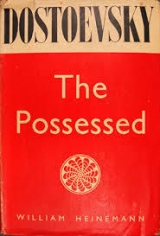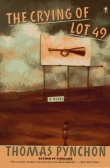
Текст книги "The Possessed"
Автор книги: Федор Достоевский
сообщить о нарушении
Текущая страница: 45 (всего у книги 49 страниц)
Pyotr Stepanovitch was in a painful state of mind. Apart from other extremely grave reasons for dissatisfaction (he was still unable to learn anything of Stavrogin), he had, it seems – for I cannot assert it for a fact – received in the course of that day, probably from Petersburg, secret information of a danger awaiting him in the immediate future. There are, of course, many legends in the town relating to this period; but if any facts were known, it was only to those immediately concerned. I can only surmise as my own conjecture that Pyotr Stepanovitch may well have had affairs going on in other neighbourhoods as well as in our town, so that he really may have received such a warning. I am convinced, indeed, in spite of Liputin's cynical and despairing doubts, that he really had two or three other quintets; for instance, in Petersburg and Moscow, and if not quintets at least colleagues and correspondents, and possibly was in very curious relations with them. Not more than three days after his departure an order for his immediate arrest arrived from Petersburg – whether in connection with what had happened among us, or elsewhere, I don't know. This order only served to increase the overwhelming, almost panic terror which suddenly came upon our local authorities and the society of the town, till then so persistently frivolous in its attitude, on the discovery of the mysterious and portentous murder of the student Shatov – the climax of the long series of senseless actions in our midst – as well as the extremely mysterious circumstances that accompanied that murder. But the order came too late: Pyotr Stepanovitch was already in Petersburg, living under another name, and, learning what was going on, he made haste to make his escape abroad. . . . But I am anticipating in a shocking way.
He went in to Kirillov, looking ill-humoured and quarrelsome. Apart from the real task before him, he felt, as it were, tempted to satisfy some personal grudge, to avenge himself on Kirillov for something. Kirillov seemed pleased to see him; he had evidently been expecting him a long time with painful impatience. His face was paler than usual; there was a fixed and heavy look in his black eyes.
“I thought you weren't coming,” he brought out drearily from his corner of the sofa, from which he had not, however, moved to greet him.
Pyotr Stepanovitch stood before him and, before uttering a word, looked intently at his face.
“Everything is in order, then, and we are not drawing back from our resolution. Bravo!” He smiled an offensively patronising smile. “But, after all,” he added with unpleasant jocosity, “if I am behind my time, it's not for you to complain: I made you a present of three hours.”
“I don't want extra hours as a present from you, and you can't make me a present . . . you fool!”
“What?” Pyotr Stepanovitch was startled, but instantly controlled himself. “What huffiness! So we are in a savage temper?” he rapped out, still with the same offensive superciliousness. “At such a moment composure is what you need. The best thing you can do is to consider yourself a Columbus and me a mouse, and not to take offence at anything I say. I gave you that advice yesterday.”
“ Idon't want to look upon you as a mouse.”
“What's that, a compliment? But the tea is cold – and that shows that everything is topsy-turvy. Bah! But I see something in the window, on a plate.” He went to the window. “Oh oh, boiled chicken and rice! . . . But why haven't you begun upon it yet? So we are in such a state of mind that even chicken ...”
“I've dined, and it's not your business. Hold your tongue!”
“Oh, of course; besides, it's no consequence – though for me at the moment it is of consequence. Only fancy, I scarcely had any dinner, and so if, as I suppose, that chicken is not wanted now . . . eh?”
“Eat it if you can.”
“Thank you, and then I'll have tea.”
He instantly settled himself at the other end of the sofa and fell upon the chicken with extraordinary greediness; at the same time he kept a constant watch on his victim. Kirillov looked at him fixedly with angry aversion, as though unable to tear himself away.
“I say, though,” Pyotr Stepanovitch fired off suddenly, while he still went on eating, “what about our business? We are not crying off, are we? How about that document?”
“I've decided in the night that it's nothing to me. I'll write it. About the manifestoes?”
“Yes, about the manifestoes too. But I'll dictate it. Of course, that's nothing to you. Can you possibly mind what's in the letter at such a moment?”
“That's not your business.”
“It's not mine, of course. It need only be a few lines, though: that you and Shatov distributed the manifestoes and with the help of Fedka, who hid in your lodgings. This last point about Fedka and your lodgings is very important – the most important of all, indeed. You see, I am talking to you quite openly.”
“Shatov? Why Shatov? I won't mention Shatov for anything.”
“What next! What is it to you? You can't hurt him now.”
“His wife has come back to him. She has waked up and has sent to ask me where he is.”
“She has sent to ask you where he is? H'm . . . that's unfortunate. She may send again; no one ought to know I am here.”
Pyotr Stepanovitch was uneasy.
“She won't know, she's gone to sleep again. There's a midwife with her, Arina Virginsky.”
“So that's how it was. . . . She won't overhear, I suppose? I say, you'd better shut the front door.”
“She won't overhear anything. And if Shatov comes I'll hide you in another room.”
“Shatov won't come; and you must write that you quarrelled with him because he turned traitor and informed the police . . . this evening . . . and caused his death.”
“He is dead!” cried Kirillov, jumping up from the sofa.
“He died at seven o'clock this evening, or rather, at seven o'clock yesterday evening, and now it's one o'clock.”
“You have killed him! . . . And I foresaw it yesterday!”
“No doubt you did! With this revolver here.” (He drew out his revolver as though to show it, but did not put it back again and still held it in his right hand as though in readiness.) “You are a strange man, though, Kirillov; you knew yourself that the stupid fellow was bound to end like this. What was there to foresee in that? I made that as plain as possible over and over again. Shatov was meaning to betray us; I was watching him, and it could not be left like that. And you too had instructions to watch him; you told me so yourself three weeks ago. ...”
“Hold your tongue! You've done this because he spat in your face in Geneva!”
“For that and for other things too – for many other things; not from spite, however. Why do you jump up? Why look like that? Oh oh, so that's it, is it?”
He jumped up and held out his revolver before him. Kirillov had suddenly snatched up from the window his revolver, which had been loaded and put ready since the morning. Pyotr Stepanovitch took ,up his position and aimed his weapon at Kirillov. The latter laughed angrily.
“Confess, you scoundrel, that you brought your revolver because I might shoot you. . . . But I shan't shoot you . . . though . . . though ...”
And again he turned his revolver upon Pyotr Stepanovitch, as it were rehearsing, as though unable to deny himself the pleasure of imagining how he would shoot him. Pyotr Stepanovitch, holding his ground, waited for him, waited for him till the last minute without pulling the trigger, at the risk of being the first to get a bullet in his head: it might well be expected of “the maniac.” But at last “the maniac” dropped his hand, gasping and trembling and unable to speak.
“You've played your little game and that's enough.” Pyotr Stepanovitch, too, dropped his weapon. “I knew it was only a game; only you ran a risk, let me tell you: I might have fired.”
And he sat down on the sofa with a fair show of composure and poured himself out some tea, though his hand trembled a little. Kirillov laid his revolver on the table and began walking up and down.
“I won't write that I killed Shatov . . . and I won't write anything now. You won't have a document!”
“I shan't?”
“No, you won't.”
“What meanness and what stupidity!” Pyotr Stepanovitch turned green with resentment. “I foresaw it, though. You've not taken me by surprise, let me tell you. As you please, however. If I could make you do it by force, I would. You are a scoundrel, though.” Pyotr Stepanovitch was more and more carried away and unable to restrain himself. “You asked us for money out there and promised us no end of things. . . . I won't go away with nothing, however: I'll see you put the bullet through your brains first, anyway.”
“I want you to go away at once.” Kirillov stood firmly before him.
“No, that's impossible.” Pyotr Stepanovitch took up his revolver again. “Now in your spite and cowardice you may think fit to put it off and to turn traitor to-morrow, so as to get money again; they'll pay you for that, of course. Damn it all, fellows like you are capable of anything! Only don't trouble yourself; I've provided for all contingencies: I am not going till I've dashed your brains out with this revolver, as I did to that scoundrel Shatov, if you are afraid to do it yourself and put off your intention, damn you!”
“You are set on seeing my blood, too?”
“I am not acting from spite; let me tell you, it's nothing to me. I am doing it to be at ease about the cause. One can't rely on men; you see that for yourself. I don't understand what fancy possesses you to put yourself to death. It wasn't my idea; you thought of it yourself before I appeared, and talked of your intention to the committee abroad before you said anything to me. And you know, no one has forced it out of you; no one of them knew you, but you came to confide in them yourself, from sentimentalism. And what's to be done if a plan of action here, which can't be altered now, was founded upon that with your consent and upon your suggestion? . . . your suggestion, mind that! You have put yourself in a position in which you know too much. If you are an ass and go off to-morrow to inform the police, that would be rather a disadvantage to us; what do you think about it? Yes, you've bound yourself; you've given your word, you've taken money. That you can't deny. . . .”
Pyotr Stepanovitch was much excited, but for some time past Kirillov had not been listening. He paced up and down the room, lost in thought again.
“I am sorry for Shatov,” he said, stopping before Pyotr Stepanovitch again.
“Why so? I am sorry, if that's all, and do you suppose . . .”
“Hold your tongue, you scoundrel,” roared Kirillov, making an alarming and unmistakable movement; “I'll kill you.”
“There, there, there! I told a lie, I admit it; I am not sorry at all. Come, that's enough, that's enough.” Pyotr Stepanovitch started up apprehensively, putting out his hand.
Kirillov subsided and began walking up and down again.
“I won't put it off; I want to kill myself now: all are scoundrels.”
“Well, that's an idea; of course all are scoundrels; and since life is a beastly thingfor a decent man ...”
“Fool, I am just such a scoundrel as you, as all, not a decent man. There's never been a decent man anywhere.”
“He's guessed the truth at last! Can you, Kirillov, with your sense, have failed to see till now that all men are alike, that there are none better or worse, only some are stupider, than others, and that if all are scoundrels (which is nonsense, though) there oughtn't to be any people that are not?”
“Ah! Why, you are. really in earnest?” Kirillov looked at him with some wonder. “You speak with heat and simply. . . . Can it be that even fellows like you have convictions?”
“Kirillov, I've never been able to understand why you mean to kill yourself. I only know it's from conviction . . . strong conviction. But if you feel a yearning to express yourself, so to say, I am at your service. . . . Only you must think of the time.”
“What time is it?”
“Oh oh, just two.” Pyotr Stepanovitch looked at his watch and lighted a cigarette.
“It seems we can come to terms after all,” he reflected.
“I've nothing to say to you,” muttered Kirillov.
“I remember that something about God comes into it ... you explained it to me once – twice, in fact. If you stopped yourself, you become God; that's it, isn't it?”
“Yes, I become God.”
Pyotr Stepanovitch did not even smile; he waited. Kirillov looked at him subtly.
“You are a political impostor and intriguer. You want to lead me on into philosophy and enthusiasm and to bring about a reconciliation so as to disperse my anger, and then, when I am reconciled with you, beg from me a note to say I killed Shatov.” ''
Pyotr Stepanovitch answered with almost natural frankness.
“Well, supposing I am such a scoundrel. But at the last moments does that matter to you, Kirillov? What are we quarrelling about? Tell me, please. You are one sort of man and I am another – what of it? And what's more, we are both of us . . .”
“Scoundrels.”
“Yes, scoundrels if you like. But you know that that's only words.”
“All my life I wanted it not to be only words. I lived because I did not want it to be. Even now every day I want it to be not words.”
“Well, every one seeks to be where he is best off. The fish . . . that is, every one seeks his own comfort, that's all. That's been a commonplace for ages and ages.”
“Comfort, do you say?”
“Oh, it's not worth while quarrelling over words.”
“No, you were right in what you said; let it be comfort. God is necessary and so must exist.”
“Well, that's all right, then.”
“But I know He doesn't and can't.”
“That's more likely.”
“Surely you must understand that a man with two such ideas can't go on living?”
“Must shoot himself, you mean?”
“Surely you must understand that one might shoot oneself for that alone? You don't understand that there may be a man, one man out of your thousands of millions, one man who won't bear it and does not want to.”
“All I understand is that you seem to be hesitating. . . . That's very bad.”
“Stavrogin, too, is consumed by an idea,” Kirillov said gloomily, pacing up and down the room. He had not noticed the previous remark.
“What?” Pyotr Stepanovitch pricked up his ears. “What idea? Did he tell you something himself?”
“No, I guessed it myself: if Stavrogin has faith, he does not believe that he has faith. If he hasn't faith, he does not believe that he hasn't.”
“Well, Stavrogin has got something else worse than that in his head,” Pyotr Stepanovitch muttered peevishly, uneasily watching the turn the conversation had taken and the pallor of Kirillov.
“Damn it all, he won't shoot himself!” he was thinking. “I always suspected it; it's a maggot in the brain and nothing more; what a rotten lot of people!”
“You are the last to be with me; I shouldn't like to part on bad terms with you,” Kirillov vouchsafed suddenly.
Pyotr Stepanovitch did not answer at once. “Damn it all, what is it now?” he thought again.
“I assure you, Kirillov, I have nothing against you personally as a man, and always ...”
“You are a scoundrel and a false intellect. But I am just the same as you are, and I will shoot myself while you will remain living.”
“You mean to say, I am so abject that I want to go on living.”
He could not make up his mind whether it was judicious to keep up such a conversation at such a moment or not, and resolved “to be guided by circumstances.” But the tone of superiority and of contempt for him, which Kirillov had never disguised, had always irritated him, and now for some reason it irritated him more than ever – possibly because Kirillov, who was to die within an hour or so (Pyotr Stepanovitch still reckoned upon this), seemed to him, as it were, already only half a man, some creature whom he could not allow to be haughty.
“You seem to be boasting to me of your shooting yourself.”
“I've always been surprised at every one's going on living,” said Kirillov, not hearing his remark.
“H'm! Admitting that's an idea, but . . .”
“You ape, you assent to get the better of me. Hold your tongue; you won't understand anything. If there is no God, then I am God.”
“There, I could never understand that point of yours: why are you God?”
“If God exists, all is His will and from His will I cannot escape. If not, it's all my will and I am bound to show self-will.”
“Self-will? But why are you bound?”
“Because all will has become mine. Can it be that no one in the whole planet, after making an end of God and believing in his own will, will dare to express his self-will on the most vital point? It's like a beggar inheriting a fortune and being afraid of it and not daring to approach the bag of gold, thinking himself too weak to own it. I want to manifest my self-will. I may be the only one, but I'll do it.”
“Do it by all means.”
“I am bound to shoot myself because the highest point of my self-will is to kill myself with my own hands.”
“But you won't be the only one to kill yourself; there are lots of suicides.”
“With good cause. But to do it without any cause at all, simply for self-will, I am the only one.”
“He won't shoot himself,” flashed across Pyotr Stepanovitch's ruined again.
“Do you know,” he observed irritably, “if I were in your place I should kill some one else to show my self-will, not myself. You might be of use. I'll tell you whom, if you are not afraid. Then you needn't shoot yourself to-day, perhaps. We may come to terms.”
“To kill some one would be the lowest point of self-will, and you show your whole soul in that. I am not you: I want the highest point and I'll kill myself.”
“He's come to it of himself,” Pyotr Stepanovitch muttered malignantly.
“I am bound to show my unbelief,” said Kirillov, walking about the room. “I have no higher idea than disbelief in God. I have all the history of mankind on my side. Man has done nothing but invent God so as to go on living, and not kill himself; that's the whole of universal history up till now. I am the first one in the whole history of mankind who would not invent God. Let them know it once for all.”
“He won't shoot himself,” Pyotr Stepanovitch thought anxiously.
“Let whom know it?” he said, egging him on. “It's only you and me here; you mean Liputin?”
“Let every one know; all will know. There is nothing secret that will not be made known. Hesaid so.”
And he pointed with feverish enthusiasm to the image of the Saviour, before which a lamp was burning. Pyotr Stepanovitch lost his temper completely.
“So you still believe in Him, and you've lighted the lamp; 'to be on the safe side,' I suppose?”
The other did not speak.
“Do you know, to my thinking, you believe perhaps more thoroughly than any priest.”
“Believe in whom? In Him?Listen.” Kirillov stood still, gazing before him with fixed and ecstatic look. “Listen to a great idea: there was a day on earth, and in the midst of the earth there stood three crosses. One on the Cross had such faith that he said to another, 'To-day thou shalt be with me in Paradise.' The day ended; both died and passed away and found neither Paradise nor resurrection. His words did not come true. Listen: that Man was the loftiest of all on earth, He was that which gave meaning to life. The whole planet, with everything on it, is mere madness without that Man. There has never been any like Him before or since, never, up to a miracle. For that is the miracle, that there never was or never will be another like Him. And if that is so, if the laws of nature did not spare even Him, have not spared even their miracle and made even Him live in a lie and die for a lie, then all the planet is a lie and rests on a lie and on mockery. So then, the very laws of the planet are a lie and the vaudeville of devils. What is there to live for? Answer, if you are a man.”
“That's a different matter. It seems to me you've mixed up two different causes, and that's a very unsafe thing to do. But excuse me, if you are God I If the lie were ended and if you realised that all the falsity comes from the belief in that former God?”
“So at last you understand!” cried Kirillov rapturously. “So it can be understood if even a fellow like you understands. Do you understand now that the salvation for all consists in proving this idea to every one I Who will prove it? I! I can't understand how an atheist could know that there is no God and not kill himself on the spot. To recognise that there is no God and not to recognise at the same instant that one is God oneself is an absurdity, else one would certainly kill oneself. If you recognise it you are sovereign, and then you won't kill yourself but will live in the greatest glory. But one, the first, must kill himself, for else who will begin and prove it? So I must certainly kill myself, to begin and prove it. Now I am only a god against my will and I am unhappy, because I am boundto assert my will. All are unhappy because all are afraid to express their will. Man has hitherto been so unhappy and so poor because he has been afraid to assert his will in the highest point and has shown his self-will only in little things, like a schoolboy. I am awfully unhappy, for I'm awfully afraid. Terror is the curse of man. . . . But I will assert my will, I am bound to believe that I don't believe. I will begin and will make an end of it and open the door, and will save. That's the only thing that will save mankind and will re-create the next generation physically; for with his present physical nature man can't get on without his former God, I believe. For three years I've been seeking for the attribute of my godhead and I've found it; the attribute of my godhead is self-will! That's all I can do to prove in the highest point my independence and my new terrible freedom. For it is very terrible. I am killing myself to prove my independence and my new terrible freedom.”
His face was unnaturally pale, and there was a terribly heavy look in his eyes. He was like a man in delirium. Pyotr Stepanoviteh thought he would drop on to the floor.
“Give me the pen!” Kirillov cried suddenly, quite unexpectedly, in a positive frenzy. “Dictate; I'll sign anything. I'll sign that I killed Shatov even. Dictate while it amuses me. I am not afraid of what the haughty slaves will think! You will see for yourself that all that is secret shall be made manifest! And you will be crushed. ... I believe, I believe!”
Pyotr Stepanoviteh jumped up from his seat and instantly handed him an inkstand and paper, and began dictating, seizing the moment, quivering with anxiety.
“I, Alexey Kirillov, declare ...”
“Stay; I won't! To whom am I declaring it?”
Kirillov was shaking as though he were in a fever. This declaration and the sudden strange idea of it seemed to absorb him entirely, as though it were a means of escape by which his tortured spirit strove for a moment's relief.
“To whom am I declaring it? I want to know to whom?”
“To no one, every one, the first person who reads it. Why define it? The whole world!”
“The whole world! Bravo! And I won't have any repentance. I don't want penitence and I don't want it for the police!”
“No, of course, there's rid need of it, damn the police! Write, if you are in earnest!” Pyotr Stepanoviteh cried hysterically.
“Stay! I want to put at the top a face with the tongue out.”
“Ech, what nonsense,” cried Pyotr Stepanoviteh crossly, “you can express all that without the drawing, by – the tone.”
“By the tone? That's true. Yes, by the tone, by the tone of it. Dictate, the tone.”
“I, Alexey Kirillov,” Pyotr Stepanoviteh dictated firmly and peremptorily, bending over Kirillov's shoulder and following every letter which the latter formed with a hand trembling with excitement, “I, Kirillov, declare that to-day, the – th October, at about eight o'clock in the evening, I killed the student Shatov in the park for turning traitor and giving information of the manifestoes and of Fedka, who has been lodging with us for ten days in Filipov's house. I am shooting myself to-day with my revolver, not because I repent and am afraid of you, but because when I was abroad I made up my mind to put an end to my life.”
“Is that all?” cried Kirillov with surprise and indignation. “Not another word,” cried Pyotr Stepanovitch, waving his hand, attempting to snatch the document from him.
“Stay.” Kirillov put his hand firmly on the paper. “Stay, it's nonsense! I want to say with whom I killed him. Why Fedka? And what about the fire? I want it all and I want to be abusive in tone, too, in tone!”
“Enough, Kirillov, I assure you it's enough,” cried Pyotr Stepanovitch almost imploringly, trembling lest he should tear up the paper; “that they may believe you, you must say it as obscurely as possible, just like that, simply in hints. You must only give them a peep of the truth, just enough to tantalise them. They'll tell a story better than ours, and of course they'll believe themselves more than they would us; and you know, it's better than anything – better than anything! Let me have it, it's splendid as it is; give it to me, give it to me!”
And he kept trying to snatch the paper. Kirillov listened open-eyed and appeared to be trying to reflect, but he seemed beyond understanding now.
“Damn it all,” Pyotr Stepanovitch cried all at once, ill-humouredly, “he hasn't signed it! Why are you staring like that? Sign!”
“I want to abuse them,” muttered Kirillov. He took the pen, however, and signed. “I want to abuse them.”
“Write ' Vive la republique,'and that will be enough.”
“Bravo!” Kirillov almost bellowed with delight. ' Vive la republique democratique sociale et universelle ou la mart!'No, no, that's not it. ' Liberte, egalite, fraternite ou la mort.'There, that's better, that's better.” He wrote it gleefully under his signature.
“Enough, enough,” repeated Pyotr Stepanovitch.
“Stay, a little more. I'll sign it again in French, you know. ' De Kirilloff, gentilhomme russe et citoyen du monde.'Ha ha!” He went off in a peal of laughter. “No, no, no; stay. I've found something better than all. Eureka! ' Gentilhomme, seminariste russe et citoyen du monde civilise!'That's better than any. . . .” He jumped up from the sofa and suddenly, with a rapid gesture, snatched up the revolver from the window, ran with it into the next room, and closed the door behind him.
Pyotr Stepanovitch stood for a moment, pondering and gazing at the door.
“If he does it at once, perhaps he'll do it, but if he begins thinking, nothing will come of it.”
Meanwhile he took up the paper, sat down, and looked at it again. The wording of the document pleased him again.
“What's needed for the moment? What's wanted is to throw them all off the scent and keep them busy for a time. The park? There's no park in the town and they'll guess its Skvoreshniki of themselves. But while they are arriving at that, time will be passing; then the search will take time too; then when they find the body it will prove that the story is true, and it will follow that's it all true, that it's true about Fedka too. And Fedka explains the fire, the Lebyadkins; so that it was all being hatched here, at Filipov's, while they overlooked it and saw nothing – that will quite turn their heads! They will never think of the quintet; Shatov and Kirillov and Fedka and Lebyadkin, and why they killed each other – that will be another question for them. Oh, damn it all, I don't hear the shot!”
Though he had been reading and admiring the wording of it, he had been listening anxiously all the time, and he suddenly flew into a rage. He looked anxiously at his watch; it was getting late and it was fully ten minutes since Kirillov had gone out. . . . Snatching up the candle, he went to the door of the room where Kirillov had shut himself up. He was just at the door when the thought struck him that the candle had burnt out, that it would not last another twenty minutes, and that there was no other in the room. He took hold of the handle and listened warily; he did not hear the slightest sound. He suddenly opened the door and lifted up the candle: something uttered a roar and rushed at him. He slammed the door with all his might and pressed his weight against it; but all sounds died away and again there was deathlike stillness.
He stood for a long while irresolute, with the candle in his hand. He had been able to see very little in the second he held the door open, but he had caught a glimpse of the face of Kirillov standing at the other end of the room by the window, and the savage fury with which the latter had rushed upon him. Pyotr Stepanovitch started, rapidly set the candle on the table, made ready his revolver, and retreated on tiptoe to the farthest corner of the room, so that if Kirillov opened the door and rushed up to the table with the revolver he would still have time to be the first to aim and fire.
Pyotr Stepanovitch had by now lost all faith in the suicide. “He was standing in the middle of the room, thinking,” flashed like a whirlwind through Pyotr Stepanovitch's mind, “and the room was dark and horrible too. . . . He roared and rushed at me. There are two possibilities: either I interrupted him at the very second when he was pulling the trigger or ... or he was standing planning how to kill me. Yes, that's it, he was planning it. ... He knows I won't go away without killing him if he funks it himself – so that he would have to kill me first to prevent my killing him. . . . And again, again there is silence. I am really frightened: he may open the door all of a sudden. . . . The nuisance of it is that he believes in God like any priest. . . . He won't shoot himself for anything! There are lots of these people nowadays 'who've come to it of themselves.' A rotten lot! Oh, damn it, the candle, the candle! It'll go out within a quarter of an hour for certain. ... I must put a stop to it; come what may, I must put a stop to it. ... Now I can kill him. . . . With that document here no one would think of my killing him. I can put him in such an attitude oh the floor with an unloaded revolver in his hand that they'd be certain he'd done it himself. . . . Ach, damn it! how is one to kill him? If I open the door he'll rush out again and shoot me first. Damn it all, he'll be sure to miss!”








